
Help us improve our website by taking this survey
It will take you just 3 minutes
Thank you!

Sustainable Tourism standards & updates
The preferred by nature standard for sustainable travel activities has been updated and redesigned to align with the preferred by nature sustainability framework while maintaining its alignment with the global sustainable tourism council (gstc) criteria. .
The Standard now includes a series of core requirements that encourage sustainable management and practices that positively impact people, nature and the climate.
With the implementation of the new Standard for Sustainable Travel Activities, we seek to achieve the following objectives:
- Encourage tourism organisations to make sustainability a core part of their business philosophy, management system and commercial strategies, so they can improve their position and reputation in responsible travel markets.
- Protect the social wellbeing, development and human rights of people and communities involved in tourism activities by ensuring fair, equal and legal labour practices are implemented, as well as relations that enhance and strengthen their economic activities and livelihoods.
- Ensure that tourism activities are carried out with respect and appreciation of all cultural expressions while emphasising the importance of preserving tangible and intangible cultural heritage.
- Preserve the environment and ecosystems in tourist destinations by implementing management systems and practices that protect their integrity and biodiversity, promote the rational use of natural resources, and mitigate negative impacts.
- Recognise certified tourism organisations for their true commitment and genuine efforts to reduce and offset GHG emissions caused by their operations – mitigating the negative impacts of the travel and tourism sector that aggravate climate change.
The Standard is designed to be applicable to any tourism organisation or activity seeking to evaluate, measure and improve its sustainability performance, regardless of their size or type of activity. This includes Accommodations, Tour Operators, Tourist centres or attractions and Multisite organisations and/or groups.
>> Explore the Standard and related documents below.
Get started
If found in conformity with the applicable criteria, a Preferred by Nature Certificate for Sustainable Travel Activities is issued to eligible tourism organisations for five years .
To maintain the certificate, certified tourism organisations must go through mandatory annual surveillance audits and at the end of the certification period, a voluntary reassessment is required to renew the certificate.
Annual audits ensure adherence to the standard's principles and occur within 60 days before the certificate's anniversary date.
During each annual audit, the organisation's Sustainability Management System and practices will be evaluated to ensure they maintain compliance with the four principles of this standard:
- Management and business practices are responsible
- People's wellbeing and human rights are respected
- Nature and the environment are protected
- Climate impacts are reduced and mitigated
Reassessment audits to renew the certification will evaluate all standard requirements in full.
Your options
The following requirements are available and also applicable to tourism organisations seeking certification against this standard:
- STP-02 System requirements: These are essential requirements for sustainable management systems that must be met during evaluation for certification.
- STP-03 Terms & definitions: Definitions of technical terms used in the standard to clarify interpretation of requirements. They are normative when interpreting standard indicators.
Preferred by Nature Standard for Sustainable Travel Activities (V1)
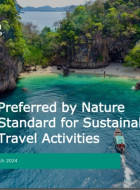
The Preferred by Nature Standard for Sustainable Travel Activities has been updated and redesigned to align with the Preferred by Nature Sustainability Framework while maintaining its alignment with the Global Sustainable Tourism Council (GSTC) Criteria.
System Requirements for Certificate Holders
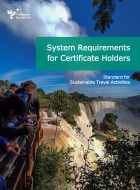
This document outlines the requirements for systems and procedures that must be in place and operational at any organisation applying for or holding a Preferred by Nature Sustainable Travel Certification.
Terms and Definitions
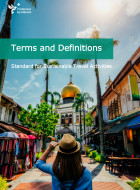
This document contains a list of terms and definitions that have been used in the Preferred by Nature Standard for Sustainable Travel Activities.
Sustainable Travel Programme Sell Sheet
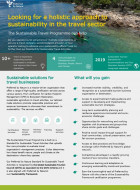
This sell sheet will help travel companies, accommodation providers, or tour operators looking to advance their sustainability efforts in the travel sector.

Green Destinations GSTC-Accredited
Certification body.
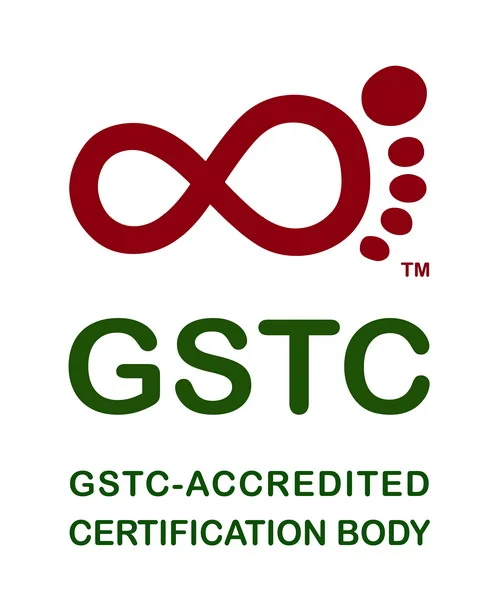
About GSTC and Green Destinations

Our Certification Programs for Destinations are structured by Green Destinations Standard, recognised by the Global Sustainable Tourism Council (GSTC) and offers GSTC-Accredited certification to destinations in recognition of sustainable destination management.
“Obtaining GSTC-Accreditation affirms Green Destinations’ effort in complying with the highest international standards in order to establish and offer awards and certification programs.” – GSTC
The GSTC-Recognised Green Destination Standard covers a set of criteria to measure, monitor and improve sustainable destination efforts.
Our GSTC-Accredited Certification Programs
Green Destinations’ Certification Program enhances destinations’ sustainability and quality, along with its visibility worldwide. Some benefits of our program are:
- Continuous and comprehensive assessment and improvement of a destination’s sustainability ‘performance’
- Accredited independent recognition of a destination’s efforts, achievements and positioning as a place that takes good care of its environment, people and culture
- The use of GSTC logo and Green Destinations Certification logos
- Promotion of the destinations across Green Destinations’ social media, website, and Good Travel Guide platform
Green Destinations first Achieved GSTC-Accreditiation in 2018 and renewed this status in 2024.
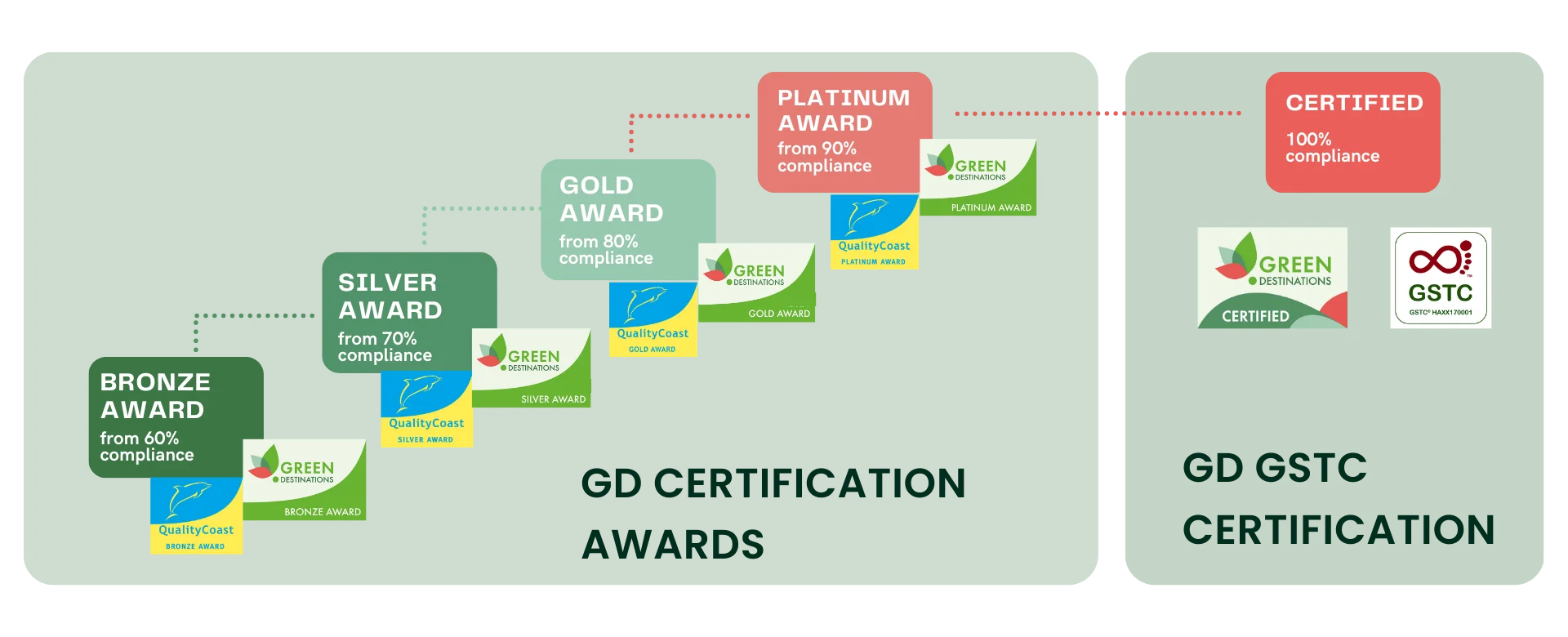
Affiliate Certification Programs
Green Destinations collaborates closely with other destination certification programs that chose Green Destinations for the back-office infrastructure and as Accredited Certification Body for their own (GSTC-Recognised) standard.
Mountain IDEAL is a certification scheme for mountain resorts in North America, with a number of well-known destinations certified such as Vail and Breckenridge (Colorado). It has a focus on the sustainability performance in a ski-resort context and is managed by the Walking Mountain Science Center.
Sustainability Label South Tyrol is a regional certification scheme in the bi-lingual Alpine region of Südtirol-Alto Adige in the north of Italy. Developed and managed by the regional organisation for Innovation, Development and Marketing (IDM), the South Tyrol Standard was derived from the GSTC-Destination Standard to become applicable to the regional context.
Our GSTC-Accreditation extends to these 2 schemes.

Our GSTC-Recognized Standard
The Green Destinations Standard (V2) is a GSTC-recognised set of criteria to measure, monitor and improve the sustainability policy and management of destinations and regions. It makes sustainable development concrete, objective and demonstrable. In 2020, the 1st GD Standard (developed in 2016) was updated based on consultation with the GD Partnership and re-aligned with the GSTC Destination Criteria V2 – prolonging its ‘GSTC Recognised Status’ in 2021.
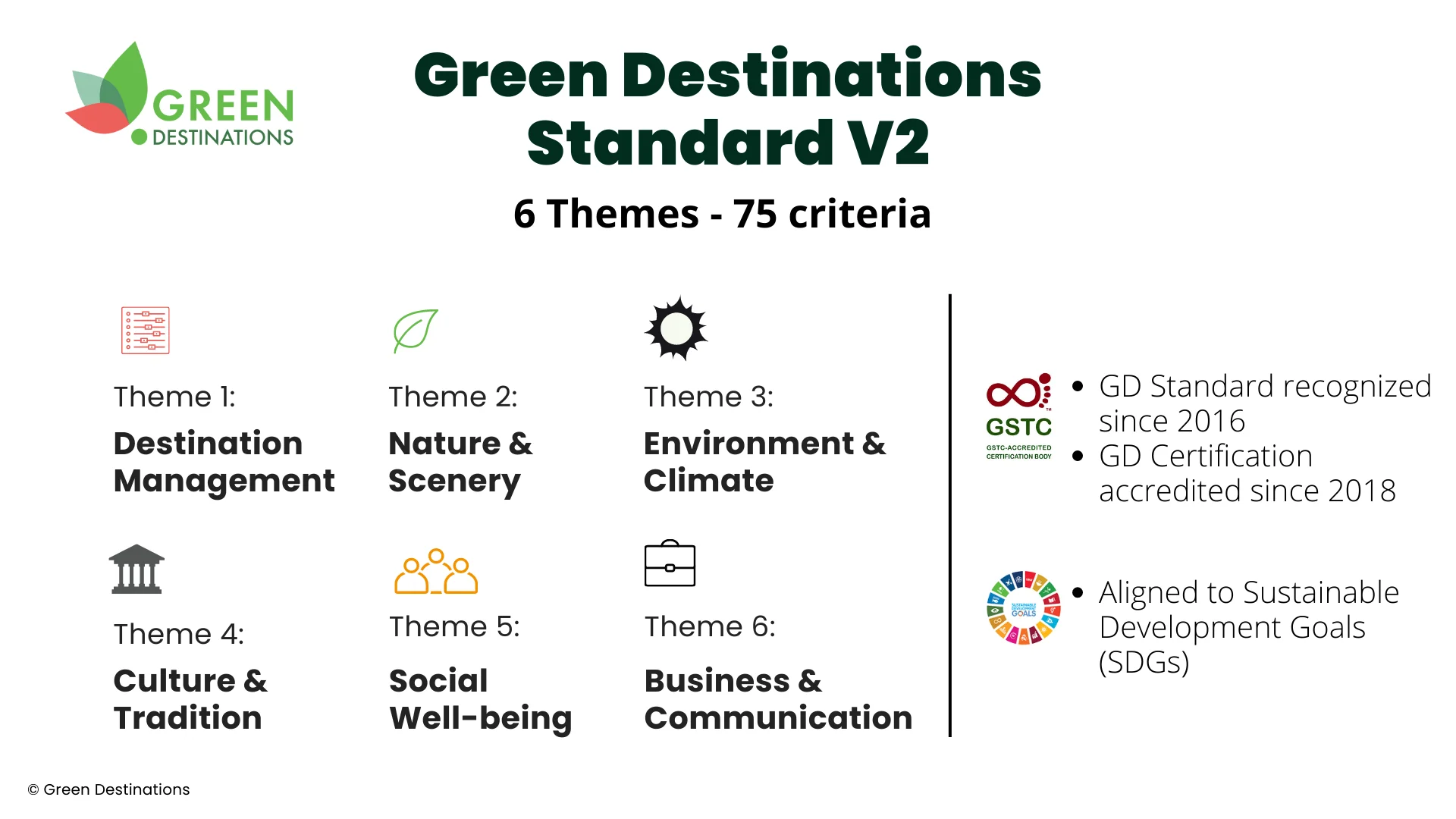
Travel, Tourism & Hospitality
Sustainable tourism worldwide - statistics & facts
What are the effects of global tourism on the climate, traveler awareness of social and environmental responsibility, key insights.
Detailed statistics
Ecotourism market size worldwide 2022-2028
Tourism-related transport's share of carbon emissions worldwide 2016-2030
Global travelers who believe in the importance of green travel 2023
Editor’s Picks Current statistics on this topic
Current statistics on this topic.
Leisure Travel
Global carbon dioxide emissions from energy 1965-2022, by region
Related topics
Recommended.
- Tourism worldwide
- Hotel industry worldwide
- Sustainable tourism in the U.S.
- Sustainable fashion worldwide
Recommended statistics
Industry overview.
- Premium Statistic Ecotourism market size worldwide 2022-2028
- Premium Statistic Global travelers who believe in the importance of green travel 2023
- Premium Statistic Sustainable initiatives travelers would adopt worldwide 2022, by region
- Premium Statistic Conscious travelers' challenges when traveling in a sustainable manner worldwide 2022
Market size of the ecotourism sector worldwide in 2022, with a forecast for 2028 (in billion U.S. dollars)
Share of travelers that believe sustainable travel is important worldwide in 2023
Sustainable initiatives travelers would adopt worldwide 2022, by region
Main sustainable initiatives travelers are willing to adopt worldwide in 2022, by region
Conscious travelers' challenges when traveling in a sustainable manner worldwide 2022
Challenges of travelers when trying to travel in a sustainable and socially conscious manner worldwide as of March 2022
Environmental impact
- Basic Statistic Global carbon dioxide emissions from energy 1965-2022, by region
- Premium Statistic Tourism-related transport's share of carbon emissions worldwide 2016-2030
- Premium Statistic Carbon footprint of tourism-related transport worldwide 2005-2030
- Premium Statistic Carbon footprint of international tourism transport worldwide 2005-2030, by type
- Premium Statistic Carbon footprint of domestic tourism transport worldwide 2005-2030, by type
Carbon dioxide emissions from energy worldwide from 1965 to 2022, by region (in million metric tons of carbon dioxide)
Tourism-related transport's share of carbon emissions worldwide 2016-2030
Share of carbon dioxide emissions coming from tourism-related transport worldwide in 2016, with a forecast for 2030
Carbon footprint of tourism-related transport worldwide 2005-2030
Carbon dioxide emissions from tourism-related transport worldwide in 2005 and 2016, with a forecast for 2030 (in million metric tons of carbon dioxide)
Carbon footprint of international tourism transport worldwide 2005-2030, by type
Transport-related emissions from international tourist arrivals worldwide in 2005 and 2016, with a forecast for 2030, by mode of transport (in million metric tons of carbon dioxide)
Carbon footprint of domestic tourism transport worldwide 2005-2030, by type
Transport-related emissions from domestic tourist arrivals worldwide in 2005 and 2016, with a forecast for 2030 (in million metric tons of carbon dioxide), by mode of transport
International tourism figures
- Premium Statistic Number of international tourist arrivals worldwide 1950-2023
- Basic Statistic Number of international tourist arrivals worldwide 2005-2023, by region
- Premium Statistic Countries with the highest number of inbound tourist arrivals worldwide 2019-2022
- Premium Statistic Global air traffic - number of flights 2004-2024
- Premium Statistic Global air traffic - scheduled passengers 2004-2022
Number of international tourist arrivals worldwide 1950-2023
Number of international tourist arrivals worldwide from 1950 to 2023 (in millions)
Number of international tourist arrivals worldwide 2005-2023, by region
Number of international tourist arrivals worldwide from 2005 to 2023, by region (in millions)
Countries with the highest number of inbound tourist arrivals worldwide 2019-2022
Countries with the highest number of international tourist arrivals worldwide from 2019 to 2022 (in millions)
Global air traffic - number of flights 2004-2024
Number of flights performed by the global airline industry from 2004 to 2023, with a forecasts for 2024 (in millions)
Global air traffic - scheduled passengers 2004-2022
Number of scheduled passengers boarded by the global airline industry from 2004 to 2022 (in millions)
Opinions and behavior
- Premium Statistic Main drivers for visiting a country by people worldwide 2023
- Premium Statistic Share of outbound travelers planning to spend more worldwide 2022, by category
- Premium Statistic Share of global travelers that want to use green lodging in the next year 2016-2022
- Premium Statistic Interest in accommodation with high sustainability standard globally 2023, by country
- Premium Statistic Reasons global travelers stayed in sustainable lodging at least once last year 2022
- Premium Statistic Demand for sustainable hotels by global corporate travel managers 2022
Main drivers for visiting a country by people worldwide 2023
Reasons to visit a country according to respondents worldwide in 2023
Share of outbound travelers planning to spend more worldwide 2022, by category
Share of travelers planning to spend more on trips abroad in selected countries worldwide in 2022, by type of expenditure
Share of global travelers that want to use green lodging in the next year 2016-2022
Distribution of global travelers intending to stay at least once in an eco-friendly or green accommodation when looking at the year ahead from 2016 to 2022
Interest in accommodation with high sustainability standard globally 2023, by country
Share of travelers who look for accommodation with impressive sustainability innovation worldwide as of July 2023, by country
Reasons global travelers stayed in sustainable lodging at least once last year 2022
Main reasons travelers stayed in sustainable accommodation at least once over the past year worldwide in as of February 2022
Demand for sustainable hotels by global corporate travel managers 2022
Importance of hotel sustainability for business travel buyers worldwide as of October 2022
Further reports Get the best reports to understand your industry
Get the best reports to understand your industry.
Mon - Fri, 9am - 6pm (EST)
Mon - Fri, 9am - 5pm (SGT)
Mon - Fri, 10:00am - 6:00pm (JST)
Mon - Fri, 9:30am - 5pm (GMT)
Helping businesses improve sustainability

Green Tourism promotes greener ways for businesses and organisations to operate, by offering our members advice on:
- Reducing energy use
- Saving water
- Efficient & eco-friendly waste disposal
- Ethical buying
- Staying local & seasonal
- Minimising food miles
- Promoting biodiversity
- Adopting a smart, sustainable outlook from top to bottom
The awards certification programme we run recognises the commitment of tourism businesses which are actively working to become more sustainable. Our Bronze/Silver/Gold awards are acknowledged worldwide as an indicator of good environmentally-friendly practice, and are a great way of progressing on a green journey as well as acting as a hallmark of ‘green quality’, attracting custom from increasing numbers of eco-minded visitors.
Our technical experts offer practical advice and lots of support – this means that saving energy and changing dated and unsustainable ways of doing things can be much more straightforward than you might think.
We want acting responsibly to become second nature to businesses in our industry, and becoming a member of Green Tourism is a brilliant first step to getting greener.
Green Tourism Criteria Definitions
Green Tourism understands that sustainability is the key to success within the modern hospitality industry. In order for the industry to be successful both nationally and internationally it is important that you have a system in place to help set targets and to show continually improvement.
DOWNLOAD >
We champion investment and improvement in local communities. When businesses devote some time and energy to contribute to local people, it becomes part of investing in a truly sustainable and ethical mindset. By encouraging staff and individuals to play their part in a business’s green journey, they will feel respected and valued; as well as ensuring a happy and eco-aware workforce.
Living and operating sustainably is a process that involves promoting and caring for the natural environment, helping conserve the local area and its economy and supporting local suppliers of ethically-produced, seasonally-grown food and drink. We encourage our members to actively introduce guests or consumers to genuine experiences, both in the great outdoors and those involving arts, craft and culture.
We are committed to a low carbon future and finding new ways to reduce our industry’s footprint. We aim to inform and inspire our participating businesses about the circular economy, ecological and cultural diversity and ensuring efficient use of our planet’s resources. We work with selected partners and affiliates to strengthen our offer as one of the world’s leading eco-friendly accreditation organisations.
WHAT TO DO NEXT?

Why you should join the growing Green Tourism family

A transparent explanation of our registration & fee structure

Take the FREE 10 minute quiz and get instantly graded

“Joining Green Tourism was one of the best things we ever did. We have halved our waste to landfill by 50% saving us nearly £90,000 per year and we have made large savings on our utility bills.”
Devon cliffs holiday park.

“Caring for the environment is fundamental to our business. Our guests expect us to be responsible. Our businesses rely on the landscape – why would we not want to protect it?”
Langdale hotel .
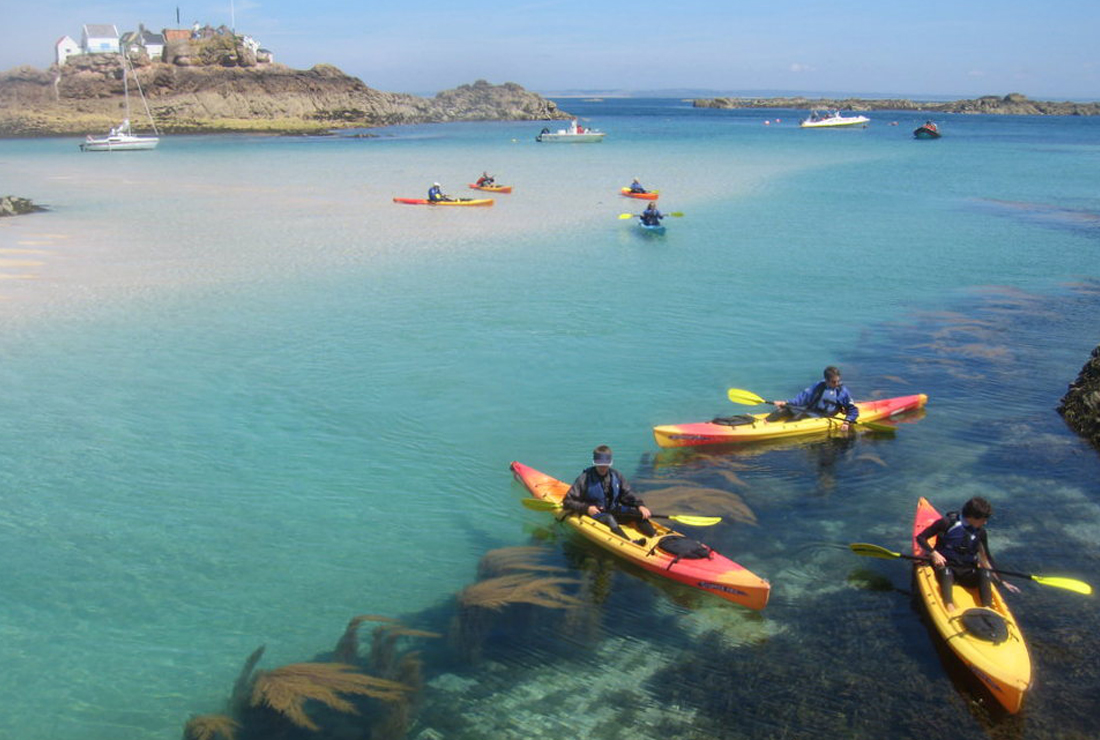
“The eco credentials of a business are becoming more important. We’ve started to get asked – especially from UK organisations – about our Green, Corporate Social Responsibility (CSR) & supplier screening policies.”
Jersey kayak adventures.

“We have been told by many guests that they choose to stay with us because of our green values and our Gold award. Other guests make frequent comments about our use of local and home-grown produce.”
Burnbank b&b, cookie policy.
By using this site you agree to our cookie policy

Encyclopedia of Tourism pp 1–2 Cite as
Green Tourism
- Pedro Pintassilgo 3
- Living reference work entry
- Latest version View entry history
- First Online: 08 December 2022
15 Accesses
The concept of green tourism has evolved over time and is presently used with different meanings. The original one, spread during the 1980s, stands for small-scale tourism which involves visiting natural areas while minimizing environmental impacts. In this line, green tourism has been used interchangeably with such concepts as ecotourism, nature tourism, and rural tourism (Sung-kwon et al. 2003 ). Businesses have generally adopted a broader meaning for green tourism: any tourism activity operating in an environmentally friendly manner.
Recently, international organizations have defined the notion in line with the concept of sustainable tourism, which also considers other dimensions than environmental protection. In fact, for the World Tourism Organization, green tourism consists of “tourism activities that can be maintained, or sustained, indefinitely in their social, economic, cultural and environmental contexts” (UNWTO 2012 : 1). For the United Nations Environment Programme, green...
This is a preview of subscription content, log in via an institution .
Line, Nathaniel, Lydia Hanks, and Li Miao. 2017. Image matters: Incentivizing green tourism behavior. Journal of Travel Research 57 (3): 296–309.
Article Google Scholar
Pintassilgo, Pedro, Patrícia Pinto, Andreia Costa, António Matias, and Maria Helena Guimarães. 2021. Environmental attitudes and behaviour of birdwatchers: A missing link. Tourism Recreation Research . https://doi.org/10.1080/02508281.2021.1920755
Sung-kwon, Hong, Seong-il Kim, and Jae-hyun Kim. 2003. Implications of potential green tourism development. Annals of Tourism Research 30: 323–341.
United Nations Environment Programme. 2011. Towards a green economy: Pathways to sustainable development and poverty eradication . Geneva: United Nations Environment Programme.
Google Scholar
UNWTO. 2012. Tourism in the green economy: Background report . Madrid: World Tourism Organization.
Download references
Author information
Authors and affiliations.
Faculty of Economics and Center for Advanced Studies in Management and Economics (CEFAGE), University of Algarve, Faro, Portugal
Pedro Pintassilgo
You can also search for this author in PubMed Google Scholar
Corresponding author
Correspondence to Pedro Pintassilgo .
Editor information
Editors and affiliations.
School of Hospitality Leadership, University of Wisconsin-Stout, Menomonie, WI, USA
Jafar Jafari
School of Hotel and Tourism Management, The Hong Kong Polytechnic University, Hong Kong, Hong Kong
Honggen Xiao
Section Editor information
Makerere University Business School, Kampala, Uganda
Peter U. C. Dieke PhD
Rights and permissions
Reprints and permissions

Copyright information
© 2022 Springer Nature Switzerland AG
About this entry
Cite this entry.
Pintassilgo, P. (2022). Green Tourism. In: Jafari, J., Xiao, H. (eds) Encyclopedia of Tourism. Springer, Cham. https://doi.org/10.1007/978-3-319-01669-6_264-2
Download citation
DOI : https://doi.org/10.1007/978-3-319-01669-6_264-2
Received : 18 May 2021
Accepted : 24 June 2022
Published : 08 December 2022
Publisher Name : Springer, Cham
Print ISBN : 978-3-319-01669-6
Online ISBN : 978-3-319-01669-6
eBook Packages : Springer Reference Business and Management Reference Module Humanities and Social Sciences Reference Module Business, Economics and Social Sciences
- Publish with us
Policies and ethics
Chapter history
DOI: https://doi.org/10.1007/978-3-319-01669-6_264-2
DOI: https://doi.org/10.1007/978-3-319-01669-6_264-1
- Find a journal
- Track your research

- GSTC Mission & Impacts
- GSTC History
- Market Access Program
- GSTC Board of Directors
- Assurance Panel
- Working Groups
- GSTC Sponsors
- GSTC Members
- Recruitment
- Contact GSTC
- GSTC For the Press
- Criteria Development, Feedback & Revisions
- Sustainable Tourism Glossary
- SDGs and GSTC Criteria
- GSTC Industry Criteria
- GSTC Destination Criteria
- GSTC MICE Criteria
- Criteria Translations
- GSTC-Recognized Standards for Hotels
- GSTC-Recognized Standards for Tour Operators
- GSTC-Recognized Standards for Destinations
- Recognition of Standards (for Standard Owners)
- GSTC-Committed
- Certification for Hotels
- Certification for Tour Operator
- Certification for Destination
- Accreditation for Certification Bodies
- Accredited Certification Bodies
- Stakeholder Consultations
- What is Certification? Accreditation? Recognition?
- Sustainable Tourism Training Program (STTP)
- Upcoming Courses
- Professional Certificate in Sustainable Tourism
- Professional Certificate in Sustainable Business Travel
- GSTC Trainers and Partners
- FAQs: GSTC Training Program
- Organization Membership Application
- Destination Membership Application
- Membership Policy
- Membership Categories & Fees
- Membership Payment Options
- Webinars for GSTC Members
- Members Log In
- Upcoming Webinars
- GSTC2024 Sweden, Apr 23-26
- GSTC2024 Singapore, Nov 13-16
- Past Conferences
- Destination Stewardship Report
Actively Green Achieves GSTC-Recognized Standard Status
March 6, 2018 – The Global Sustainable Tourism Council (GSTC) is pleased to announce that the Actively Green standard has achieved the ‘GSTC-Recognized Standard’ status.
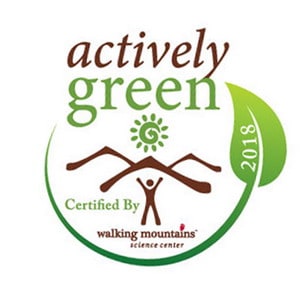
The Actively Green standard is the core component used in the Actively Green Sustainable Business Training and Certification Program. It was launched as an innovative legacy initiative of the 2015 FIS Alpine World Ski Championships in Vail and Beaver Creek, Colorado, USA through a partnership with Sustainable Travel International and Town of Vail. The Actively Green standard has been used in the Actively Green program, that has currently certified 53 businesses in the Vail Valley since its inception. Hundreds of employees have participated in a variety of sustainable tourism training sessions. Another component of the Program is the Mountain IDEAL destination standard for mountain resort communities.
Achieving the GSTC-Recognized status means that a sustainable tourism standard has been reviewed by GSTC technical experts and the GSTC Accreditation Panel and deemed equivalent to the GSTC Criteria for sustainable tourism. Additionally, an organization that meets GSTC requirements must administer the standard. GSTC Recognition does not ensure that the certification process is reliable, only that the set of standards used to certify includes the minimum elements to ensure sustainability. The purpose of the GSTC programs is to reward genuine practitioners of sustainable tourism, which in turn builds confidence and credibility with consumers.
“By gaining GSTC-Recognized status for their set of sustainability standards, the Actively Green program has provided the marketplace and their stakeholders strong evidence that they see sustainability broadly, to include the four pillars of sustainability: management, social/community, cultural, and environmental issues,” says Randy Durband, GSTC CEO.
“The Actively Green standard has given us a roadmap to implement sustainable tourism with businesses of all sizes throughout our destination. Participating hotels, tour operators and other types of businesses have saved money, engaged their employees in sustainability best-practices, and the program continues to gain momentum,” says Kim Langmaid Ph.D., Walking Mountains Science Center’s founder and vice-president.
In addition to the Actively Green industry standard, Walking Mountains’ destination standard, Mountain IDEAL, is also GSTC-Recognized.
To date, 8 destination standards , and 30 hotels and tour operators standards have achieved GSTC-Recognized status. The completion of these step-wise programs rewards standard owners for their commitment to sustainability while offering the market a proof that these standards adhere to international norms.
The GSTC will continue to work with organizations around the world to provide GSTC Recognition of standards for sustainability in travel and tourism. GSTC Recognition does not ensure that a certification process is reliable, only that the set of standards used to certify are equivalent to the GSTC Criteria.
GSTC-Recognized standard owners are encouraged to complete the Accreditation process which relates to the quality and neutrality of their certification process. Achieving a GSTC-Accredited status affirms that their certification process follows the highest international standards while further distinguishing their standards and processes amongst other certification programs. Learn more about GSTC Accreditation .
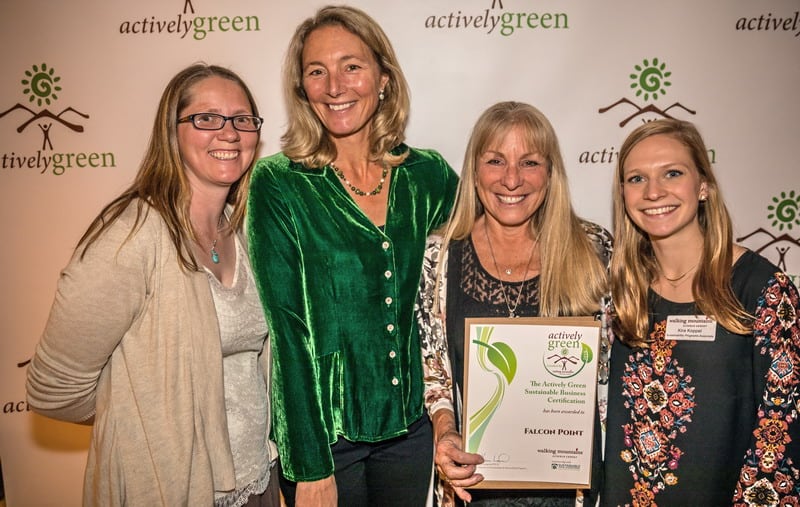
Actively Green Annual Awards Ceremony 2017 at Sonnenalp Hotel in Vail, Colorado, USA
About the GSTC
The Global Sustainable Tourism Council (GSTC) establishes and manages global sustainable tourism standards with the aim of increasing sustainable tourism knowledge and practices among public and private stakeholders. The GSTC is an independent and neutral USA-registered 501(c)3 non-profit organization that establishes and manages global baseline standards for sustainability in travel and tourism. The standards are two sets of GSTC Criteria: Destination Criteria and Industry Criteria , the minimum requirements for tourism businesses and destinations to pursue in order to protect and sustain the world’s natural and cultural resources, along with conservation and poverty alleviation. The GSTC represents a diverse and global membership , including UN agencies, leading travel companies, hotels, country tourism boards, tour operators, individuals and communities – all strive to achieve best practices in sustainable tourism.
Media Contact: [email protected]
About Walking Mountains
Walking Mountains Science Center is a 501(c)3 non-profit based in Avon, CO and their mission is to awaken a sense of wonder and inspire environmental stewardship and sustainability through natural science education. Their sustainability department provides trainings and coaching through their Actively Green , and Mountain IDEAL programs; in addition to providing zero waste events, energy efficiency assessments and incentives, and climate action planning and Collaboration . Most recently Walking Mountains facilitated the creation of the Climate Action Plan for the Eagle County Community and is supporting Vail, CO in becoming the first certified sustainable destination in the United States. Visit www.walkingmountains.org or call 970.827.9725 for more information.
Media Contacts: [email protected] or [email protected]
Share This Story, Choose Your Platform!
Related posts.

Preferred by Nature Standard gains GSTC-Recognized Standard Status

Bioscore Standard gains GSTC-Recognized Standard Status

Tokyo Convention & Visitors Bureau Joins GSTC

Mission Moscow : A Conversation with Evgeny Kozlov
Mr. Evgeny Kozlov, Deputy Head Mayor of Moscow Government and Chairman of the Moscow City Tourism Committee, who has come to the city to attain BLTM, the annual prestigious travel event at the Leela Ambience Convention Centre, Delhi spoke with TW Editor Anirban Dasgupta on his vision and goal with the all-new tourism initiatives in Moscow.
The bond between India and Russia has a long history of culture, literature, love, and of course politics. But recently, there has also been a lot of talk about Gastronomical tourism. Any personal experience with this?
My personal take on the bond between India and Russia stems from my recent experience of trying authentic Indian cuisine in Moscow. I thoroughly enjoyed the spicy flavours of the Curry dish I tried and it left a lasting impression on me. This made me appreciate the cultural exchange between our two countries even more. I believe that Moscow, being a culinary hub, is a great place for people from all over the world, including Indian visitors, to immerse themselves in our rich history and culture. It’s a unique experience that brings people together and showcases the diversity of the gastronomic universe. Moscow has a thriving food scene with various international cuisines to explore, from Chinese to South African and Latin American. This culinary diversity reflects the open-mindedness and curiosity of the Russian people when it comes to trying new types of food. Moscow truly has something for everyone, and I encourage Indian tourists to come and indulge in this gastronomic journey.

How optimistic are the post-pandemic recovery figures?
After the Covid-19 pandemic, we have witnessed a remarkable recovery in tourism in Moscow. In fact, we have been able to restore 90% of the pre-pandemic tourist flow. In the first half of 2023, almost a million foreign tourists visited Moscow, with over 600,000 of them arriving during the summer season. Among the non-CIS countries, China has led the way in terms of tourist traffic, followed by Iran, the United Arab Emirates, Turkey, and India. Prior to the pandemic, India’s tourist flow was steadily growing at a rate of 12-15% annually. Although we faced challenges during the pandemic, we have now put in place all the necessary conditions for a successful recovery. Moscow is known for hosting numerous international exhibitions, forums, congresses, and conferences, attracting approximately 3.6 million business visitors in the past year alone. Among these visitors, India ranks third in terms of foreign business tourists in Moscow. To further promote tourism, we have initiated the MICE Ambassadors training program in India, which aims to assist Indian businesses in exploring opportunities and selecting relevant events in Moscow.
Can you please share your vision for future tourism development in Moscow?
Thank you for asking this question. I have a multi-faceted vision for the future tourism development in Moscow.
Firstly, I believe that tourism should provide a personal and authentic experience for each individual. Therefore, customization of experiences is crucial. For business tourists, we aim to offer special infrastructure facilities that cater to their specific needs and requirements. We are closely collaborating with infrastructure providers to ensure seamless experiences for those visiting Moscow for business purposes. On the other hand, when it comes to leisure or family tourists, we recognize the importance of providing a support system and guidelines for those traveling with their families, especially children. We are working with museums, theatres, and restaurants to customize their services and products to cater to tourists of all ages, including children. Furthermore, I envision rearranging tourism in Moscow to encourage visitors to delve into the history and heritage of our country. A significant part of my tourism goal is to motivate and inspire the youth and younger generations to travel to Russia. This involves providing affordable pricing for accommodations, entertainment, museums, and other attractions.
We are already constructing tailor-made infrastructure that specifically targets the young generation in Russia, and by next year, we plan to extend and promote these offerings to international young visitors as well. By rebranding the image of Moscow as a destination for longer stays, relaxation, and enjoying various facilities, we aim to change the perception that it is merely a transit or stop-over city. Lastly, the beautiful weather in Moscow during the summer months provides an opportunity to create delightful memories for tourists. I want every visitor to experience the sunshine, green landscapes, parks, cafes, restaurants, swimming pools, and sports facilities that Moscow has to offer during this time.
In summary, my vision for the future of tourism in Moscow revolves around creating customized travel experiences for every type of traveller.
How do you prioritize sustainability and responsible tourism practices in the development of business tourism?

How easy or difficult is it to get a Visa for an Indian Tourist at present?
Acquiring a Visa for Indian tourists has become easier with the introduction of the e-visa system. Since its launch in August 2023, more than 30,000 tourists have already utilized this system. The e-visa offers several advantages over traditional visas, such as avoiding the need to visit consulates or embassies. The application process only requires a digital photograph and a scan of the passport data page. The e-visa has a validity period of 60 days from the date of issuance, with a maximum stay of 16 days in Russia. This convenient and streamlined process is available to citizens of 55 countries, including India. Indian tourists are currently ranked third in terms of business travellers from outside the CIS countries visiting Moscow.
Author: Anirban
Share article, related news.

BLTM 2023 showcases top destinations for Bleisure and MICE Travel

École Ducasse Abu Dhabi Studio, in partnership with Erth Hospitality, to open this December
No comment be the first one., leave a reply cancel reply.
Your email address will not be published. Required fields are marked *
Save my name, email, and website in this browser for the next time I comment.
- A Guide To The Most...
A Guide to the Most Beautiful Green Spaces in Moscow

Home to more parks than any other city in Russia , Moscow offers a cornucopia of choice when it comes to green spaces. From innovative wild urbanism to 18th-century royal estates, here are the best places to escape from the city buzz in Russia’s capital.
Spread over a territory of almost 300 acres, Gorky Park is Moscow’s most popular green space. Opened in 1928, it was designed as ‘a city inside a city’ with its own telegraph, police unit and a doctor’s office. Some 90 years later, Gorky Park offers everything from segway rides to an open-air movie theatre, through to illuminating lectures and fantastic dining spots.
9 Krimsky Val, Moscow, Russia , +7 495 995 00 20

As the name implies, Muzeon is perfect for art lovers. The park plays host to art fairs, exhibitions, music festivals and video performances. But even if you don’t care for art, Muzeon has a lot to offer: from an elegant boardwalk to hip coffee shops to an in-ground fountain, where you can actually cool off in summer.
2 Krimsky Val, Moscow, Russia , +7 985 382 27 32

Hermitage Garden
Opened in 1894, the Hermitage garden is a lovely compact park, nestled between high rise buildings in Moscow center. Home to theaters New Opera, Hermitage and Sphera, the garden is predictably crowded, with theatre-goers along with office workers from the business centres in Tverskaya – all flock here for a green respite.
3 Karetnyy Ryad, Moscow, Russia , +7 495 699 04 32
Sokolniki Park
An open-air cinema, a rope course, amusement park, bike rentals and more – Sokolniki is 1,275 acres of fun. In winter the whole park turns into one of Moscow’s most famous skating rinks. Sokolniki gradually blends into Losiny Ostrov National Park – the world’s third largest forest in a city.
1 Sokol’nicheskiy Val, bld. 1, Moscow, Russia , +7 499 393 92 22
Izmailovsky Park
Moscow’s biggest park, Izmailovsky stretches for almost 3,800 acres. Particularly favored by hikers and cyclists, the forest-like park is a popular family spot, equipped with a ferris wheel, outdoor gyms and all kinds of places to eat.
7 Alleya Bol’shogo Kruga, Moscow, Russia , +7 499 166 61 19

Tsaritsyno Museum-Reserve
Tsaritsyno estate is a perfectly reconstructed specimen of 18th century architecture set amid a lush green forested area. The only park in Moscow that boasts a light and music fountain, Tsaritsyno draws crowds with spectacular night water shows.
1 Dol’skaya Ulitsa, Moscow, Russia , +7 499 725 72 87

Severnoye Tushino Park
Despite a rather remote location, this park is definitely worth a visit. A half-a-century old apple garden, serene views on Khimkinskoye reservoir and a dry-docked submarine housing a Museum of Submarine Navy will definitely make up for the ride from the city centre.
Ulitsa Svobody, Moscow, Russia , +7 495 640 73 55

Kolomenskoye
Kolomenskoye Park is not merely a tranquil green space, but a celebrated museum reserve, where nature and historically significant architecture blend together. Here you can see one of Moscow’s oldest churches Church of the Ascension and a former residence of the Tsar Aleksey Mikhailovich Romanov, the father of Peter the Great. It’s also perfect for romantic walks along the Moskva river.
39 Andropova Ave, Moscow, Russia , +7 499 782 89 17

In this park you’re guaranteed to encounter some ducks, woodpeckers, squirrels, hares and urban wildlife. The park is also famous for its beautiful boardwalk, open-air cinema, ropes course Panda Park, gallery of retro cars and a variety of places to eat.
22/1 Ulitsa Bol’shaya Filevskaya, Moscow, Russia , +7 499 145 45 05

The former estate of the Sheremetev family, Kuskovo is a fascinating piece of 18th-century Russia. Home to 20 unique architectural monuments, it is Moscow’s only historical park with a French formal garden, decorated with green walkways, marble statue and state-of-the art pavilions.
44/2 3-Ya Muzeynaya Ulitsa, Moscow, Russia

Since you are here, we would like to share our vision for the future of travel - and the direction Culture Trip is moving in.
Culture Trip launched in 2011 with a simple yet passionate mission: to inspire people to go beyond their boundaries and experience what makes a place, its people and its culture special and meaningful — and this is still in our DNA today. We are proud that, for more than a decade, millions like you have trusted our award-winning recommendations by people who deeply understand what makes certain places and communities so special.
Increasingly we believe the world needs more meaningful, real-life connections between curious travellers keen to explore the world in a more responsible way. That is why we have intensively curated a collection of premium small-group trips as an invitation to meet and connect with new, like-minded people for once-in-a-lifetime experiences in three categories: Culture Trips, Rail Trips and Private Trips. Our Trips are suitable for both solo travelers, couples and friends who want to explore the world together.
Culture Trips are deeply immersive 5 to 16 days itineraries, that combine authentic local experiences, exciting activities and 4-5* accommodation to look forward to at the end of each day. Our Rail Trips are our most planet-friendly itineraries that invite you to take the scenic route, relax whilst getting under the skin of a destination. Our Private Trips are fully tailored itineraries, curated by our Travel Experts specifically for you, your friends or your family.
We know that many of you worry about the environmental impact of travel and are looking for ways of expanding horizons in ways that do minimal harm - and may even bring benefits. We are committed to go as far as possible in curating our trips with care for the planet. That is why all of our trips are flightless in destination, fully carbon offset - and we have ambitious plans to be net zero in the very near future.

Food & Drink
The best halal restaurants in kazan.

Restaurants
The best halal restaurants in kaliningrad.

Incredible Photos From the Longest Bike Race in the World

Unusual Facts About the Soviet Union

Guides & Tips
A 48 hour guide to astrakhan, russia.

A Soviet Pilot Went Missing in Afghanistan and Was Found 30 Years Later

The Mystery Behind Russia's Buddhist "Miracle"

A Guide to Cautionary Russian Proverbs and What They Mean

Zhenotdel: The Soviet Union's Feminist Movement

Russian Last Names and Their Meanings

See & Do
Russia's most remote holiday destinations.

The Soviet Union’s Best Heart-Throbs and Pinups
Culture trip spring sale, save up to $1,100 on our unique small-group trips limited spots..

- Post ID: 1695896
- Sponsored? No
- View Payload

COMMENTS
Green Tourism Active is a non profit organisation offering global sustainability assessments and certifications including: Hotels, BnBs', Lodges, Tour Operators and more. Green Tourism Active is a Global Sustainable Tourism Council (GSTC) recognised standard. Our in depth assessment programmes are continually developed and are at the ...
to help you attract the rapidly expanding sustainable tourism market. Green Tourism Active (GT-Active) is a not for profit, sustainability assessment, certification and awards management company and is a Global Sustainability Tourism Council recognized standard for accommodation. Join our forward thinking globally compliant programme now.
The awarded status affirms Green Tourism Active's commitment to promote sustainable tourism products and services. The GT-Active standard offers a complete and forward thinking, in-depth assessment of business operations, including sustainability management factors as well as environmental, socio-economic, cultural and conservation efforts.
The GT-Active program includes numerous standards including ISO14001, SABS, GSTC, USEPA, EEA(EU) and various other regional, national and global standard requirements. Our leading certifications include global standards including: GSTC - Global Sustainable Tourism Council Criteria ISO 14001 - Environmental management Standard
Green Tourism Active (GT-Active) is a global sustainability assessment and certification organisation. The GTA certification programs offer a forward thinking and leading global standard with in-depth focus on environmental, socio-economic, cultural and conservation performance and compliance in accordance with rigorous GSTC criteria and ...
"TUI delivered 10.3 million 'greener and fairer' holidays through 1,688 hotels that were certified to a standard recognised by the Global Sustainable Tourism Council in 2019." TUI Group "We continue to identify opportunities to achieve GSTC certification for our hotels to ensure the sustainability of our operations."
By verifying against the Preferred by Nature Sustainable Tourism Certification, your company will be able to promote itself in a credible way, as a responsible tourism service provider within the global tourism sector and the growing responsible tourism market worldwide. The Preferred by Nature Standard for Sustainable Travel Activities was ...
This requires active tourism policies and recovery measures to drive the transition to greener tourism business models and value chains, and improve the environmental outcomes for destinations, while delivering benefits to local economies and communities. ... Most OECD countries have some form of quality standard or green certification ...
The Preferred by Nature Standard for Sustainable Travel Activities has been updated and redesigned to align with the Preferred by Nature Sustainability Framework while maintaining its alignment with the Global Sustainable Tourism Council (GSTC) Criteria.. The Standard now includes a series of core requirements that encourage sustainable management and practices that positively impact people ...
A Framework for Sustainable Tourism Business Development . Standard Development . The Actively Green Business Standard was developed in collaboration with Sustainable Travel International and Walking Mountains Science Center with support from Town of Vail. The v1 standard was implemented by local businesses from November 2013 - Present. All ...
The Green Destinations Standard (V2) is a GSTC-recognised set of criteria to measure, monitor and improve the sustainability policy and management of destinations and regions. It makes sustainable development concrete, objective and demonstrable. In 2020, the 1st GD Standard (developed in 2016) was updated based on consultation with the GD ...
About - Green Tourism Active. Delivering a leading international online, verified & consultancy-based certification programme. Increasing client profits through improved efficiencies and cost reductions. Ensuring client best practice through benchmarking and continuous improvement. Raising client awareness and facilitating behavioural change ...
Download reference work entry PDF. The concept of green tourism has evolved over time and is presently used with different meanings. The original one, spread during the 1980s, stands for small-scale tourism which involves visiting natural areas while minimizing environmental impacts. In this line, green tourism has been used interchangeably ...
The GSTC-Recognized status refers to the standard itself, indicating that a sustainable tourism standard has been reviewed by GSTC technical experts and the GSTC Assurance Panel and deemed the content of the standard equivalent to the GSTC Criteria for sustainable tourism.
When surveyed in 2022, over 80 percent of global travelers said that sustainable tourism was important to them and that they were willing to adopt sustainable travel incentives, something that has ...
The awards certification programme we run recognises the commitment of tourism businesses which are actively working to become more sustainable. Our Bronze/Silver/Gold awards are acknowledged worldwide as an indicator of good environmentally-friendly practice, and are a great way of progressing on a green journey as well as acting as a hallmark ...
The concept of green tourism has evolved over time and is presently used with different meanings. The original one, spread during the 1980s, stands for small-scale tourism which involves visiting natural areas while minimizing environmental impacts. In this line, green tourism has been used interchangeably with such concepts as ecotourism ...
Significant challenges of the COVID-19 pandemic highlighted that features of a modern, sustainable and resilient city should not only relate to fulfilling economic and social urban strategies, but also to functional urban design, in particular, related to urban blue and green infrastructure (BGI). Using results from a web-based questionnaire survey conducted May-July 2020 in Moscow (Russia ...
March 6, 2018 - The Global Sustainable Tourism Council (GSTC) is pleased to announce that the Actively Green standard has achieved the 'GSTC-Recognized Standard' status. The Actively Green standard is the core component used in the Actively Green Sustainable Business Training and Certification Program. It was launched as an innovative legacy initiative of the 2015 […]
Mr. Evgeny Kozlov, Deputy Head Mayor of Moscow Government and Chairman of the Moscow City Tourism Committee, who has come to the city to attain BLTM, the annual prestigious travel event at the Leela Ambience Convention Centre, Delhi spoke with TW Editor Anirban Dasgupta on his vision and goal with the all-new tourism initiatives in Moscow. The bond between India and Russia has a long history ...
Izmailovsky Park. Moscow's biggest park, Izmailovsky stretches for almost 3,800 acres. Particularly favored by hikers and cyclists, the forest-like park is a popular family spot, equipped with a ferris wheel, outdoor gyms and all kinds of places to eat. 7 Alleya Bol'shogo Kruga, Moscow, Russia, +7 499 166 61 19.
A Framework for Sustainable Tourism Business Development . Standard Development . The Actively Green Business Standard was developed in collaboration with Sustainable Travel International and Walking Mountains Science Center with support from Town of Vail. The v1 standard was implemented by local businesses from November 2013 - Present. All ...
On 27 May 2021, Moscow City placed the first green subfederal bond issue worth 70 billion roubles on MOEX's Sustainability Sector, with BCS Global Markets acting as the Co-Arranger. The 74th Moscow City bond issue worth 70 billion roubles was placed in full, with х1.23 oversubscription after receiving 721 bids with a total size of 86.3 ...